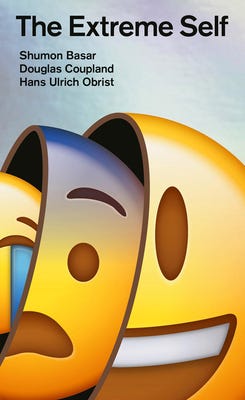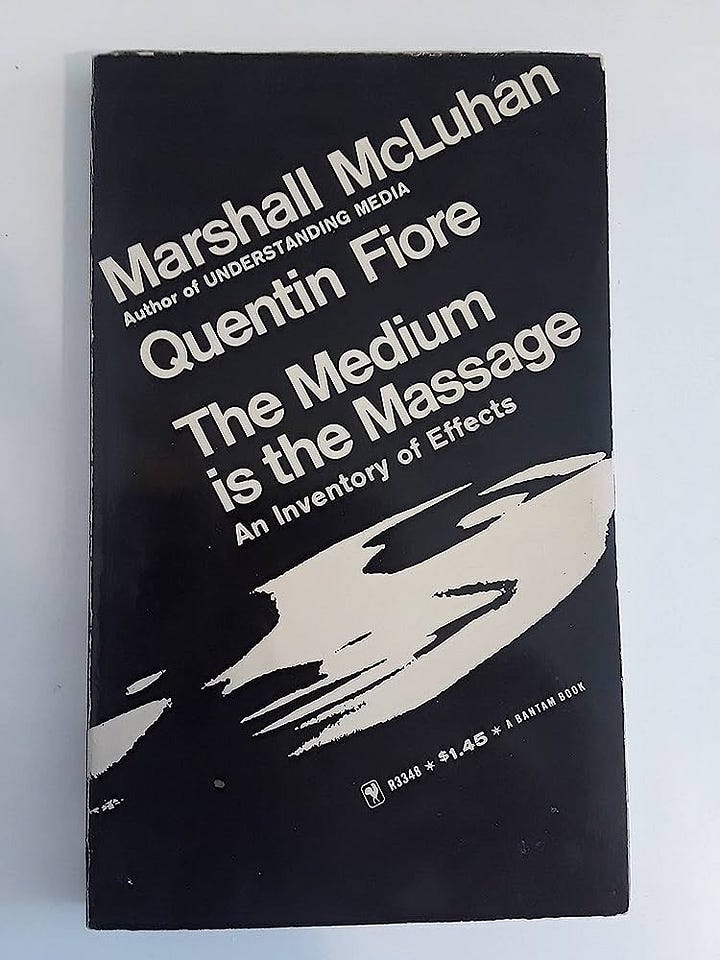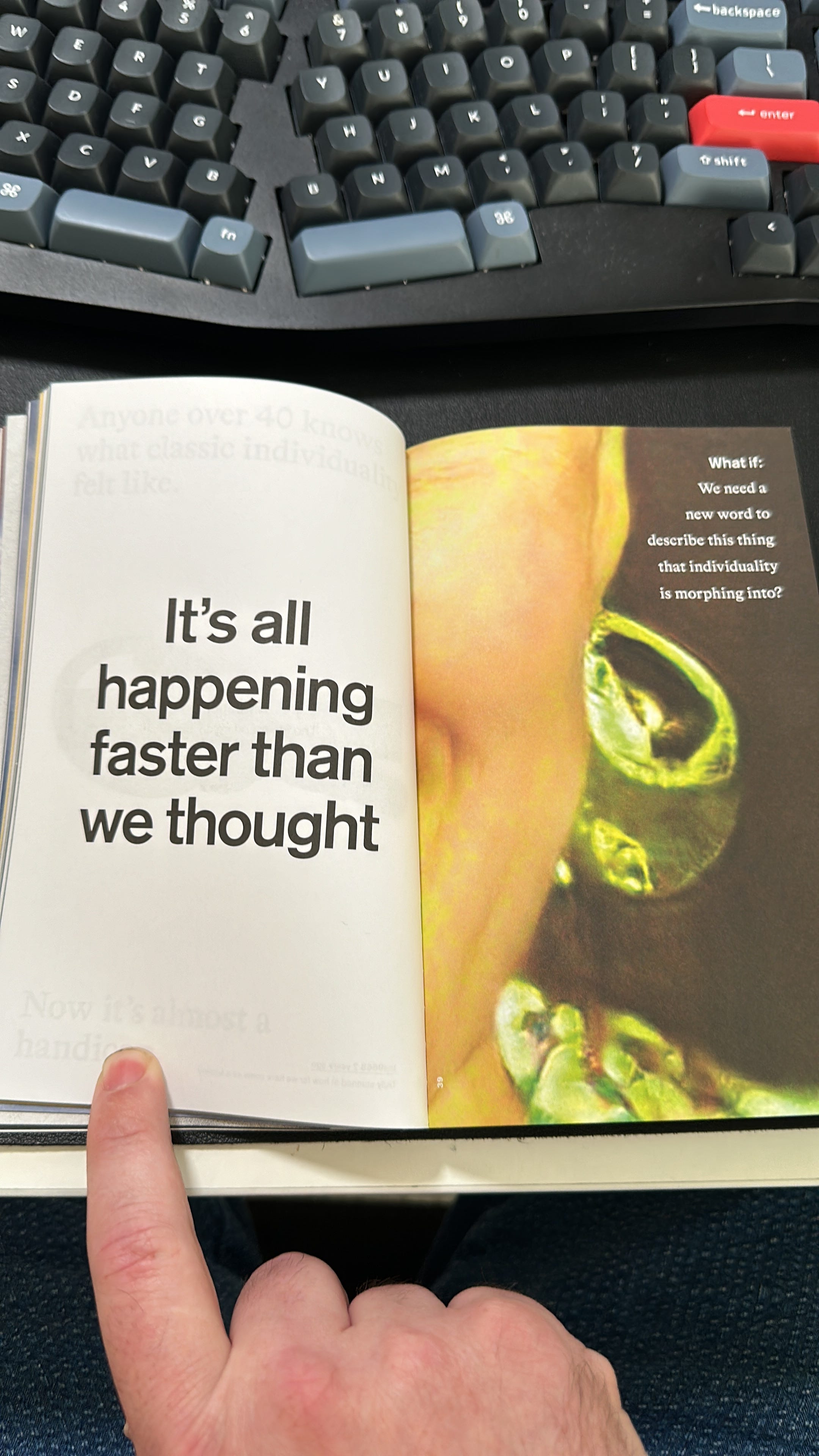This is an entry in The Good Books, PEP’s vertical about books & the authors who write them.
Over the weekend, I speed-read (sped-read?) through The Extreme Self by Shumon Basar, Douglas Coupland, and Hans Ulrich Obrist. It (along with its predecessor The Age of Earthquakes), is a spiritual sequel of sorts to McLuhan & Fiore’s The Medium is the Massage: An Inventory of Effects.


McLuhan communicated in maxims and axioms—definitive & declarative statements intended to elicit a response in the reader and listener. The authors of The Extreme Self channel the same energy, and utilize the same sort of artbook graphic design that as McLuhan & Fiore, but updated for the internet age.
Re: Mcluhan - As a long aside, whether you agree with McLuhan or not is immaterial (he is even alleged to have said “I don’t necessarily agree with everything I say,”). I understand McLuhan first and foremost as an agitator who uses language to get certain ideas stuck in your craw—why the hell does ‘electric man lives mythically and all-at-once,’ or ‘first we shape our tools and thereafter our tools shape us’ and other imagery live rent-free in my head?
He has been valorized for helping form the field of media studies, and can be rightly criticized for his blind spots—work that has been built upon in collections like Re-Understanding Media: Feminist Extensions of Marshall McLuhan. In one instance of McLuhan agitating a reader, Jeff Jarvis recounts speaking to eminent book historian Elizabeth Eisenstein in his recent book The Gutenberg Parenthesis:
“In the early 1960s, Elizabeth Eisenstein, then a professor teaching history at American University, read Marshall McLuhan’s The Gutenberg Galaxy. “It blew my mind,” she told me in an interview for an earlier book. On the one hand, Eisenstein wanted to refute McLuhan when he “seemed to take mischievous pleasure in the loss of familiar historical perspectives.” She was offended that he dispensed “with chronological sequence and historical context altogether.” On the other hand, his theses intrigued her as “I had long been dissatisfied with prevailing explanations for the political and intellectual revolutions of Early Modern times.” She wanted to do proper research into the effect of printing. But as she began work, Eisenstein was shocked that “I could not find a single book, or even a sizeable article which attempted to survey the consequences of the fifteenth-century communications shift.” “For the next two years,” she told me, “I was a little crazy.” She was critical of McLuhan and wary of being dismissed as McLuhanite.”
The Extreme Self is an even more direct descendant of McLuhan’s decades of agitation, and it has agitated me over the past couple of days.
In a period where Elon has so successfully broken the spell of what was once Twitter, when we can see the media environments we inhabit with a bit more clarity, I wonder if it will give us an opportunity to re-evaluate how the internet makes us think and feel.
For instance, how quickly fatigue sets in (I am already tired of the Barbenheimer discourse):
In the same way that The Medium is the Massage agitates, so does The Extreme Self. It made these broad pronouncements about the political right and left:
Q: What is micro-othering?
A: Micro-othering is the use of ever-thinner slices of identity to define, deplatform, and limit the agency of others.
Micro-othering has turned the Left into a circular firing squad - to the glee of the Right.
‘Call-out culture’ feels like the loudest form of culture today.
Calling for nuance has become the same as admitting guilt and complicity.
Q: What is microfascism?
A: Microfascism is when online aggression spills into real world aggression - tiny or large acts of aggression and confrontation used to define, deplatform, and limit the agency of others.
Microfascism has turned the Right into a circus act - to the disgust of the Left.
‘Outrage culture’ feels like the loudest form of culture today.
It’s actually astonishing how much the Left and Right have in common.
One does not have to fully agree with this premise. But it is compelling, and speaks to at least some of our personal experiences with making people upset online.
Other koans include the following:
I do not know why “the opposite of invisibility is no longer being seen” feels so true. But it does.
I think the reason why these books, both The Extreme Self and The Medium is the Massage, are so effective is their use of synecdoche. Our experience within digital culture (‘digital culture’ being an increasingly redundant phrase) is so pervasive that only by isolating & exaggerating parts of it can one hope to signify the whole.
I don’t know that one can escape ‘digital culture’ any more than one can escape the realities of climate change and the consequences of fundamentalist beliefs. Which is why I find myself drawn to these books. They don’t make life easier, but they at least make them a little more comprehensible.
Thanks for reading. If you want to keep up with my work, subscribe below. You can also support me by using the affiliate links in this post, or using my Bookshop.org page.





